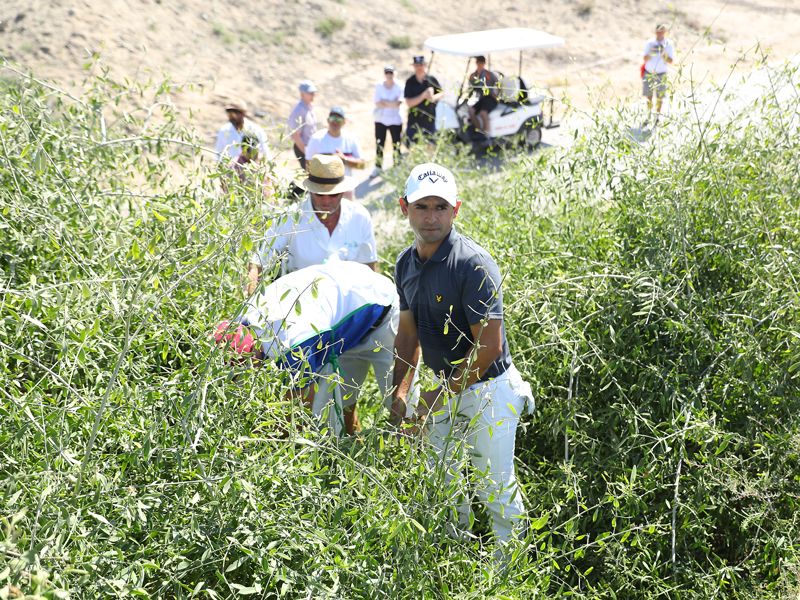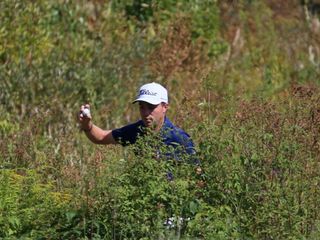Is The Three Minute Search Long Enough?
Is three minutes ample time or simply not long enough?


GM regulars Jeremy Ellwood and Fergus Bisset debate whether or not three minutes provides sufficient time to find a lost ball.
Is The Three Minute Search Long Enough?
Yes says Jeremy Ellwood
The new Rules have been in force for some time now, and despite the early alarmist reaction of tour pros, golf as we know it has not come to an end.
Those I’ve played with have just been getting on with things, and, heaven forbid, even embracing putting with the flagstick in, for example.
That new Rule and others were partly borne out of a desire to do whatever is possible from a Rules perspective to get golfers moving a little quicker, hence the reduction of the search time from five to three minutes.
I have to say I have no qualms about this whatsoever.
Get the Golf Monthly Newsletter
Subscribe to the Golf Monthly newsletter to stay up to date with all the latest tour news, equipment news, reviews, head-to-heads and buyer’s guides from our team of experienced experts.
Who, really, even times a ball search anyway?
Maybe a few more now, and that might not be a bad thing, but I get pretty fed up searching for my own ball for too long with frustration and anxiety rising as you realise you’re on the verge of effectively adding two shots to your score.
Five minutes prolongs that agony; three minutes keeps things moving for all concerned.
In my last round, our group was hunting for five or six balls, so there’s ten to 12 minutes potentially saved there.
Yes, you may sometimes find a ball in five minutes that you wouldn’t find in three, but I prefer to think of this Rule change as a betterment for the field rather than something that costs me a couple of shots every now and then.
Finally, with the penalty for accidentally moving your ball during a search gone, there’s no longer that slight disincentive to get as actively involved as others.
You can now search as earnestly, or indeed frantically, as you wish, so let's think of it as a condensed yet more purposeful search.
Is The Three Minute Search Long Enough?
No says Fergus Bisset
Efforts to expedite play can only be considered a good thing and the shift from a five-minute to a three-minute limit when searching for a ball was introduced with this admirable objective in mind.

Whether it’s either fair or effective though is questionable.
A three-minute search limit frequently gives amateur golfers insufficient time to make a reasonable effort to find a ball and this has possible consequences.
Rule 18.2 states that a ball is lost if not found in three minutes after the player or his or her caddie begins to search for it.
With such a small window now available, are players more inclined to delay reaching the vicinity of a potentially difficult situation until all playing partners are ready to help with a possible search? - Poor etiquette that could definitely slow play down.
Also, what about when a ball is unexpectedly lost?
Three minutes is up pretty fast and, more frequently in this scenario, people will find themselves with no option but to trudge back and hit again.
In instances where there are a couple of possible spots the ball could be located, three minutes gives scant time to explore.
Say a line of gorse separates two fairways – It might be the ball is within the gorse and visible from the player’s fairway.
If not, it might be visible within the gorse from the other side.
But, with only three minutes to play with, it might not be possible to check the other side within the time limit. That seems harsh.
There are undoubtedly instances when a ball is most definitely lost, and 30 minutes of searching would prove fruitless.
Players should be able to accept when this is the case.
But there are occasions when finding a ball will help play flow and giving reasonable chance for this to happen seems sensible.

Fergus is Golf Monthly's resident expert on the history of the game and has written extensively on that subject. He has also worked with Golf Monthly to produce a podcast series. Called 18 Majors: The Golf History Show it offers new and in-depth perspectives on some of the most important moments in golf's long history. You can find all the details about it here.
He is a golf obsessive and 1-handicapper. Growing up in the North East of Scotland, golf runs through his veins and his passion for the sport was bolstered during his time at St Andrews university studying history. He went on to earn a post graduate diploma from the London School of Journalism. Fergus has worked for Golf Monthly since 2004 and has written two books on the game; "Great Golf Debates" together with Jezz Ellwood of Golf Monthly and the history section of "The Ultimate Golf Book" together with Neil Tappin , also of Golf Monthly.
Fergus once shanked a ball from just over Granny Clark's Wynd on the 18th of the Old Course that struck the St Andrews Golf Club and rebounded into the Valley of Sin, from where he saved par. Who says there's no golfing god?
-
 Rory McIlroy's Masters Odds Slashed Despite Northern Irishman Complaining Of Minor Elbow Issue
Rory McIlroy's Masters Odds Slashed Despite Northern Irishman Complaining Of Minor Elbow IssueThe Northern Irishman is being heavily backed by golf fans in the United Kingdom and Ireland ahead of his latest attempt at completing the career Grand Slam
By Jonny Leighfield Published
-
 How Far Does The Average Female Club Golfer Hit Their Driver?
How Far Does The Average Female Club Golfer Hit Their Driver?We've looked at the data... Find out if you are hitting your driver an average distance
By Alison Root Published